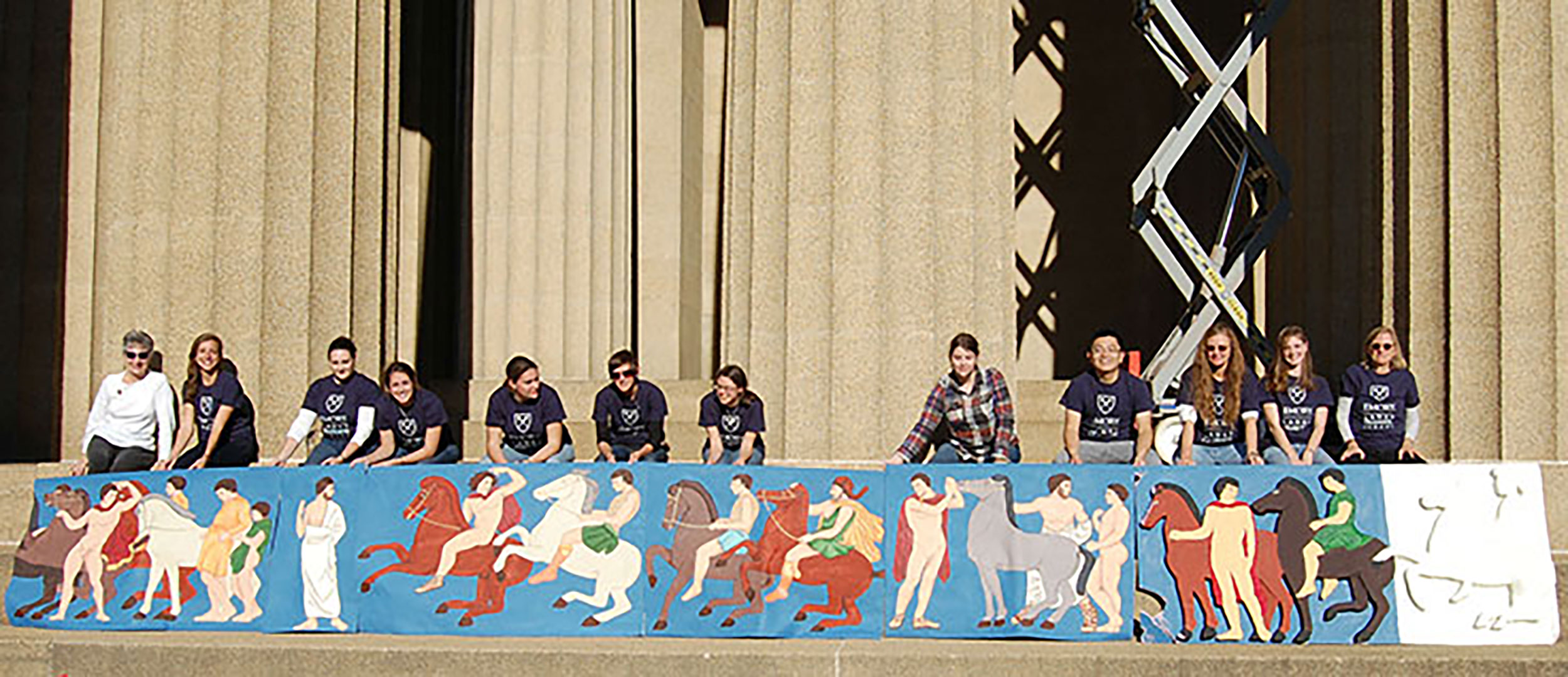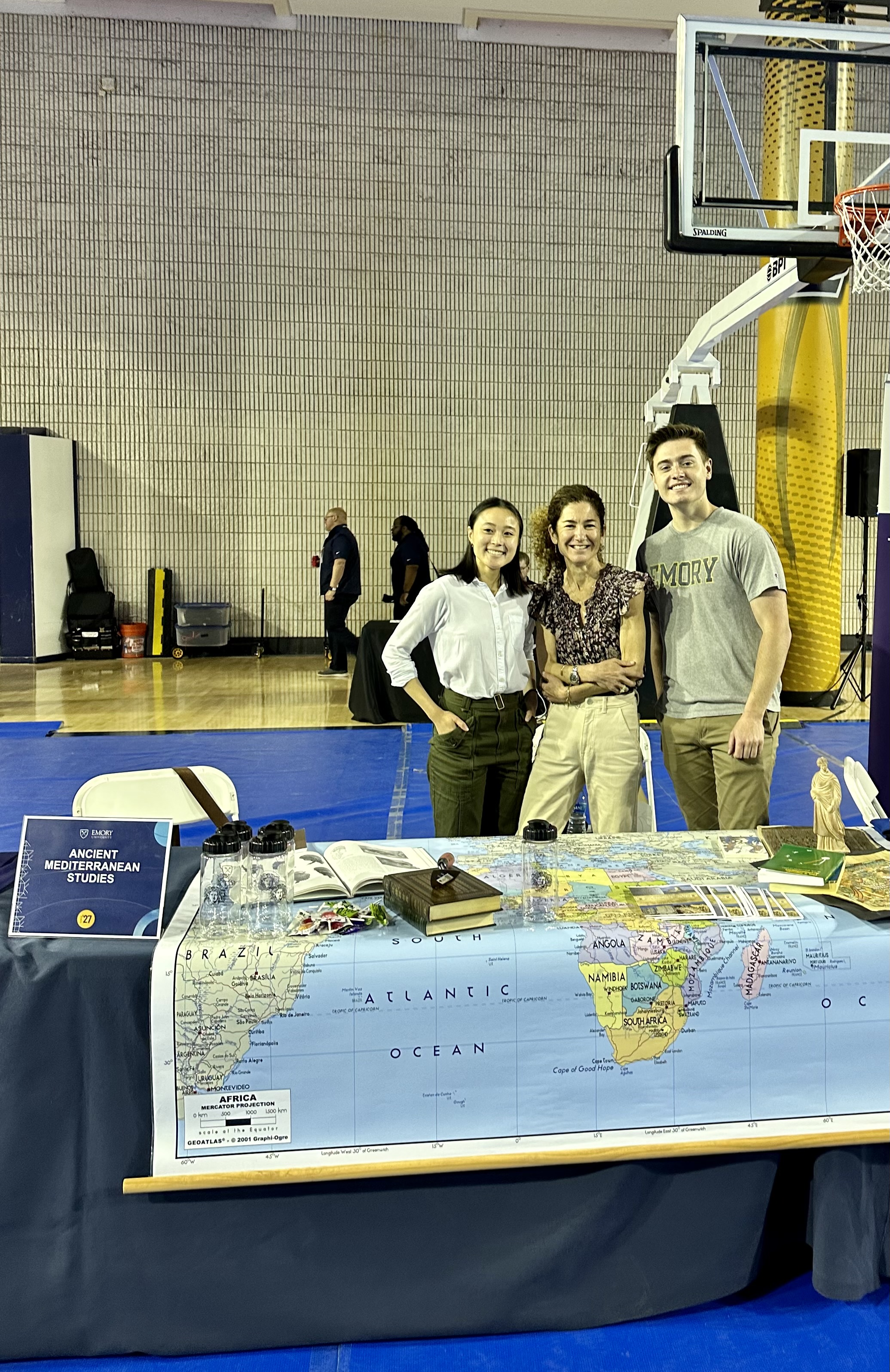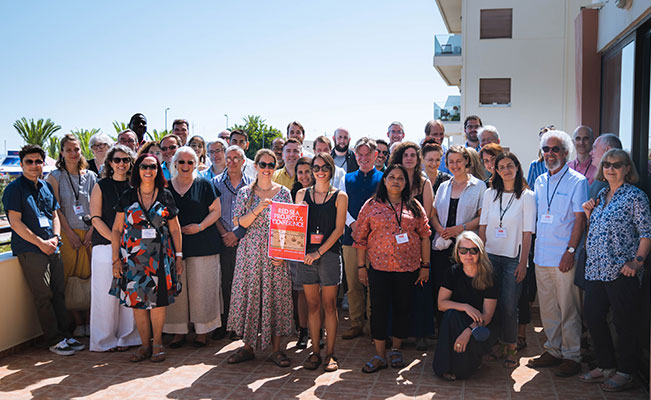
News
Ancient Mediterranean Studies at Emory Academic Fair

In 2023 Sophie Vo, Harrison Helms, and program director Roxani Margariti represented Ancient Mediterranean Studies at the Emory Academic Fair.
“An Imported Cultural Tradition in Material Abundance: The Islamic Gravestones of Ottoman Crete”
Emory Department of Middle Eastern and South Asian Studies and Georgia State University Center for Hellenic Studies are pleased to present:
Dr. Antonis Anastasopoulos
Department of History and Archaeology
University of Crete
Monday, January 30, 2023
7:00pm
Oxford Road Building, Presentation Room
1390 Oxford Road NE, Floor 3
Emory University
Ottoman Islamic gravestones acquired a distinctive, standardized form by the 16th century, long before the Ottoman Empire conquered the island of Crete in the years 1645-1669. This presentation will provide an overview of the main characteristics of the Ottoman Islamic gravestones that have survived in Crete (mid-17th–early 20th century) and highlight the discrepancy between Greek being the mother tongue of most Cretan Muslims and Ottoman Turkish being the language of the epitaphs on the gravestones. We will see that the gravestones constituted an imported cultural tradition not only in terms of their epitaphs but also with regard to their shapes and decorations. Yet their acceptance as visual objects made up for their illegibility in the literal sense of the word, and their “foreignness” did not hinder their wide dissemination across Crete as markers of social prestige and wealth. Furthermore, a comparison of the Ottoman Turkish epitaphs of the gravestones with death-related folk couplets in Greek nuances the concept of clearly defined cultural identities. This case study exemplifies the flexibility that human societies may exhibit in their forms of cultural expression.
Professor Antonis Anastasopoulos teaches Ottoman history in the Department of History and Archaeology of the University of Crete, Greece, and is a member of the Institute for Mediterranean Studies (a branch of the Foundation for Research and Technology-Hellas). He earned his Ph.D. at the University of Cambridge, and has taught in France and Turkey. He is Vice-President of CIEPO (Comité International des Etudes Pre-Ottomanes et Ottomanes) and Editor-in-Chief of journal Turkish Historical Review. He specializes in the study of the Ottoman provinces, political relations in the 18th century, Islamic gravestones of the Ottoman period, and the history of water resources management.
Co-Sponsors: Program in Mediterranean Archaeology; Department of History
“Tériade and His Vision of Greece through the Lens of French Modernism: From Idealism to Nostalgia”
Emory Program in Ancient Mediterranean Studies and Georgia State University for Hellenic Studies are pleased to present:
Dr. Poppy Sfakianaki
Postdoctoral Research Fellow
Seeger Center for Hellenic Studies
Princeton University
7:00pm
1390 Oxford Road NE, Floor 3
Emory University
Tériade (Efstratios Eleftheriadis, 1897–1983), a Greek from Lesvos (Mytilene) who settled in Paris in 1916, built an important career in the French art world first as an art critic and later as an art publisher. Throughout his career, Tériade promoted a moderate modernism as can be seen both in his texts that appeared in major Parisian art journals and newspapers and in the luxurious books and journal he published in collaboration with many famous artists (Henri Matisse, Pablo Picasso, Marc Chagall, Joan Miró, etc.). This talk discusses how his contact with French modernism shaped his relationship with and perception of Greece and Greek art, both ancient and contemporary. Initially, he promoted the image of an atemporal, utopian and universal Greece in the way that a French Philhellene would do, arguing that French modern art was heir to the values of ancient Greek art. In a later phase, Tériade developed nostalgia for Greece and especially for his native island. The fruit of this nostalgia was the donation to the Greek State of two museums with precious art collections: the Theophilos Museum (1965) and the Museum-Library Stratis Eleftheriadis-Tériade (1979), built on family land in Lesvos. These two museums contributed not only to the cultural and economic life of his home island but also to the “repatriation” of Tériade and his legitimization among the Greek intelligentsia and public as a diasporic Greek who was a great benefactor of his homeland.
Dr. Poppy Sfakianaki is an art historian specializing in the study of modern art, and in particular the art press, mediators in the art world, cultural transfers, and the construction of the artists’ image. She holds a Ph.D. in Art History from the University of Crete. She has held fellowships from the Institute for Mediterranean Studies of the Foundation for Research and Technology-Hellas and The Panayotis and Effie Michelis Foundation. She has participated in various research projects in Greece and France and has published articles in peer reviewed academic journals and edited volumes. Her current book project concerns Tériade’s career and network, while she has embarked on a new project on Hercule Joannidès as a cultural mediator who organized cultural cruises from France to Greece during the interwar period.
Co-Sponsor: Department of Middle Eastern and South Asian Studies
The Red Sea Project X Conference

AMS was co-sponsor to the Red Sea Project X conference in Rethymno, Greece. The Red Sea Project conference series is an international forum for interdisciplinary research focused on the Red Sea as a diachronic geohistorical unit.
Since 2002, Red Sea Project conferences have been hosted by institutions of higher education and research across Europe and once in the Middle East, with support from several organizations, including the Foundation for the Study of Arabia, the British Museum, the European Research Council and participating universities and cultural heritage authorities. The joint inquiry on the societies, cultures, and civilizations of the Red Sea has thus far produced seven edited volumes.
AMS and MESAS are collaborating with the Institute for Mediterranean Studies (Foundation for Research and Technology-Hellas) and the University of Crete to host the tenth event in this productive series at the city of Rethymno. Conference themes will explore edges and transitions in the histories and material cultures of the Red Sea, historical and historiographical horizons, divisions and invisible boundaries in Red Sea research, transregional connectivities and comparative perspectives in maritime history, as well as the study of islands and insularity.